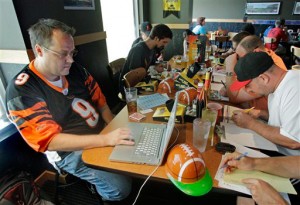Fantasy football: Time to get in the game?
By: DOLAN MEDIA NEWSWIRES//September 2, 2014//
By Jim Calloway
Dolan Media Newswires
They’re almost here: those crisp, autumn Sunday afternoons that many football fans barely notice, as they are inevitably glued to their televisions and mobile devices.
These days, perhaps not surprisingly, some of the most focused watchers of the National Football League may not really care which team wins. They care about their own team: their fantasy football team.
For the uninitiated, fantasy sports involves fans setting up competitive leagues and drafting real professional players for their teams. Points are scored based on the actual player’s performance on the field.
The NFL has been supportive of the concept, often showing how various players rank for fantasy points for the day during TV broadcasts. Online sites manage the scoring live and most have mobile access. So you can check your phone and learn that a moment ago, Adrian Peterson scored a 45-yard touchdown not only for the Vikings, but for your team as well.
So what does this have to do with lawyers? Most leagues offer cash prizes, and fantasy sports has consequently become big business. According to a report on NPR’s “All Tech Considered”: “The analysts at IBISWorld forecasted fantasy sports brought in $1.2 billion in 2013, representing a threefold growth since 2004. The Fantasy Sports Trade Association says 33 million Americans take part in one fantasy sport or another — and 24 million of them play fantasy football.”

With serious money involved, this fun hobby can take on some serious overtones. It’s one thing if the losers have to buy a few rounds of drinks for the winners. It is another if 12 team owners enter a $1,000 buy-in league, resulting in $12,000 in prize money to be distributed. At that point it might be wise to pay someone to manage the league and/or arbitrate disputes.
In its feature “Cashing in on the Fantasy-Sports Economy,” Planet Money listed a number of businesses that have grown up around fantasy sports, from agencies who insure your star players against injury to authorities functioning as judges on whether a late-season trade is fair or should be overturned. One company, LeagueSafe, simply holds the stakes during the season — and has grown to eight employees.
A lot of these new opportunities sound tailor-made for lawyers. We deal with equity and dispute resolution on a daily basis. If your league does become embroiled in litigation over prize money, would you rather have a lawyer-arbitrator make the contested decision, or a grocery store employee with several years of fantasy football experience?
Most of these opportunities probably do not generate what many lawyers would view as significant income — yet — but a growing industry with eight-figure revenue means a lot of lawyers have made a lot of money and will make a lot more.
A solo who loves fantasy sports and brings in a few extra dollars managing a few leagues and arbitrating in others might find it the most “fun” money he makes each year, even if the return is closer to minimum wage than to a billable hour rate.
The point is that we’re talking about an opportunity fueled by technology advances. The roots of fantasy sports involved getting the newspaper the next day and manually adding up your team’s score. Few today would have the patience for that.
There will be many more new and exciting opportunities for lawyers on the virtual gridiron. Stay alert.
Editor’s note: In many cases, playing fantasy football for money is entirely legal under federal law. The Unlawful Internet Gambling Enforcement Act of 2006 includes an explicit carve-out for fantasy sports games that meet three criteria: (1) the value of the prizes is not determined by the number of participants or the amount of fees paid; (2) all winning outcomes reflect the relative knowledge and skill of the participants; and (3) the fantasy game’s result is not based on the final scores of any real-world games. Based on that language, most traditional versions of fantasy football would comply with federal law.
Jim Calloway is the director of the Oklahoma Bar Association Management Assistance Program. He publishes the weblog Jim Calloway’s Law Practice Tips.
Legal News
- State Bar leaders remain deeply divided over special purpose trust
- Former Wisconsin college chancellor fired over porn career is fighting to keep his faculty post
- Pecker says he pledged to be Trump campaign’s ‘eyes and ears’ during 2016 race
- A conservative quest to limit diversity programs gains momentum in states
- Wisconsin prison inmate pleads not guilty to killing cellmate
- Waukesha man sentenced to 30 years for Sex Trafficking
- 12-year-old shot in Milwaukee Wednesday with ‘serious injuries’
- Milwaukee man convicted of laundering proceeds of business email compromise fraud schemes
- Giuliani, Meadows among 18 indicted in Arizona fake electors case
- Some State Bar diversity participants walk away from program
- Wisconsin court issues arrest warrant ‘in error’ for Minocqua Brewing owner
- Iranian nationals charged cyber campaign targeting U.S. Companies
WLJ People
- Power 30 Personal Injury Attorneys – Russell Nicolet
- Power 30 Personal Injury Attorneys – Benjamin Nicolet
- Power 30 Personal Injury Attorneys – Dustin T. Woehl
- Power 30 Personal Injury Attorneys – Katherine Metzger
- Power 30 Personal Injury Attorneys – Joseph Ryan
- Power 30 Personal Injury Attorneys – James M. Ryan
- Power 30 Personal Injury Attorneys – Dana Wachs
- Power 30 Personal Injury Attorneys – Mark L. Thomsen
- Power 30 Personal Injury Attorneys – Matthew Lein
- Power 30 Personal Injury Attorneys – Jeffrey A. Pitman
- Power 30 Personal Injury Attorneys – William Pemberton
- Power 30 Personal Injury Attorneys – Howard S. Sicula











